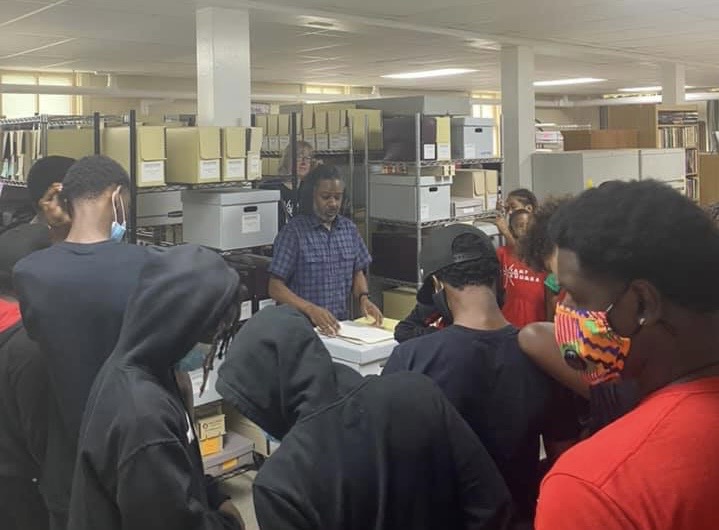Raising kings: Camp Kuumba invests in the future of Evanston’s young Black men
Photo courtesy of Jamal Graham.
Camp Kuumba participants hear from Evanston historian Dino Robinson during a field trip to the Shorefront Legacy Center. The camp provides programming and support for young Black men from third to eighth grade.
January 23, 2022
Content warning: This story contains mentions of gun violence.
Founded in 2020 by Evanston Township High School educators in the wake of gun violence, Camp Kuumba seeks to enhance the futures of young Black men in the city through lessons on financial responsibility, educational activities and mentor relationships.
In November 2020, former ETHS basketball starter Ryan Bost was shot and killed by an unidentified perpetrator in Rogers Park while in a parked car. Camp Kuumba administrator Marx Succès said the death of the young athlete was a call to action.
“A committee of educators got together looking for a way to reach out to African American young men and how to serve them and their families as students of color,” Succès said.
Camp Kuumba is a part of Equity & Empowerment for Evanston Families, a nonprofit dedicated to providing support and free opportunities for the city’s “most needy African American young people,” Succès said.
What sets Camp Kuumba apart from other summer programs is the year round attention paid to students over the course of their academic career, President Rudy Meo said.
“We want to connect, stay attached, teach them things they don’t learn at school or at home, and continue to build that relationship annually by the time they turn 18,” Meo said.
As part of the extensive summer curriculum, students from third to eighth grade participated in weekly field trips and art classes and heard from influential Black professionals, including Northwestern professors, former Shorefront Legacy Center Director Dino Robinson and Ald. Bobby Burns (5th).
Succès said the daily African American speaker series featured native Evanston judges, lawyers, business owners and college students to make campers feel represented in a world beyond “the streets,” Succès said.
“The idea behind everything we did was to show our young men people that look like them,” Succès said.
Campers enjoyed the opportunity to see the inside of NU’s science labs and athletic facilities, Succès said. Student athletes spoke to the young men about finding a balance between their academic and athletic commitments, which he said proved to campers the ability of Black men to succeed in areas outside of sports.
Community service organizer Jamal Graham got involved with Camp Kuumba in 2020. He said he connected with campers over a similar upbringing and wished his own adolescence had included the camp’s guidance.
“If I’d had this camp growing up as a Black man in Evanston, some of the scenarios I ended up in would not have happened,” Graham said. “Having those people who look like you telling you positive things goes a long way.”
Daily stipends of “Kuumba Cash,” a fake currency the young men could invest or purchase snacks with throughout the summer, were used to teach lessons of financial literacy. Succès said those who saved up were rewarded with prizes at the end of the program along with an understanding of responsibility and accountability.
To implement these life skills in the real world, Succès said Camp Kuumba invested real cash into custodial accounts for every member of the program with the help of participants’ families.
“We will follow them through grade school, middle school and high school and hopefully that money will grow into something they can use if they plan to go to college or for anything they want to do,” Succès said.
Meo said his hope for graduates of Camp Kuumba’s program is for them to realize their unlimited potential even in the face of adversity. No matter their desired destination, Meo said he wants students to leave with knowledge necessary to achieve Succèss in every aspect of life.
With help from the community and donations, Succès said plans to expand programming to include young Black women and Latinx students are in the works. Succès called upon NU students to get involved with the organization’s mission as volunteer tutors, coaches or mentors.
“Our students already look at NU students as bigger than life,” Succès said. “Having NU students come once a week or twice a week to work with our kids and build those relationships would be priceless.”
Email: [email protected]
Twitter: @nixiestrazza
Related Stories:
— Black historian Dino Robinson honored with street name
— YWCA program teaches web design to historically excluded groups
— Evanston Organizes: Evanston’s black community lacked recognition for decades. Shorefront Legacy Center aims to give it to them.


